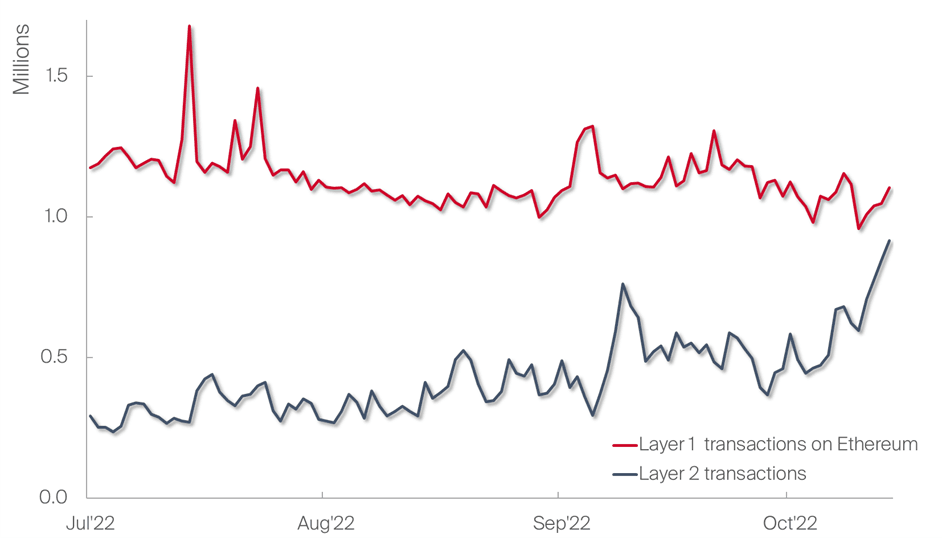
Fidelity survey, tweaked App Store guidelines

1. Fidelity survey reveals that 74% of Institutions plan to buy crypto
The Facts:
- On Thursday, Fidelity Digital Assets revealed key findings from their 2022 Institutional Investor Digital Assets Study that included 1’052 investors from family offices, digital and traditional hedge funds, pension, financial advisers, endowments and foundations, and high net worth individuals across Asia, Europe and the U.S.
- 58% of the surveyed investors reported owning digital assets in the first half of 2022, an increase of 6% YoY.
- Crypto hedge funds and venture capital funds had the highest percentage of investments in digital assets at 87% followed by HNWIs (82%) and financial advisors (73%).
- While digital asset allocation remains highest in Asia at 69%, Europe (67%) and the U.S. (42%) saw the highest increase at 11-points and 9-points, respectively.
- 88% argued that digital assets appeal to them due to the potential upside, the technological innovation, the decentralization and the low correlation to other assets while price volatility and security issues were cited as concerns.
- Around 35% of respondents, up from 23% in 2021, think that digital assets should be treated as a separate investment class.
Why it’s important:
- Despite total crypto market cap being down around $2t to $1.02t from the top in 2021, institutions remain bullish on crypto and mostly increased their adoption in recent months.
- According to Fidelity Digital Assets’ President Tom Jessop they “believe that digital assets fundamentals remain strong and that the institutionalization of the market over the past several years has positioned it to weather recent events”.
- This posture is also reflected by Fidelity’s actions as they recently announced that they’ll beef up their digital assets unit by 100 more hires bringing its headcount to roughly 500.
- Since nearly 40% of the institutions primarily buy BTC and ETH directly, Fidelity will also bring ETH trading this week after recently launching an Ethereum Index Fund.
- Furthermore, the Fidelity survey matches other recent surveys such as the one of Charles Schwab indicating a sustained and strong interest in digital assets across the investor spectrum.
- The study of Charles Schwab showed this week, that 46% of GenZ and 45% of millennials would like to invest in crypto via 401(k)s.
2. Apple tweaks App Store guidelines for crypto and NFTs
The Facts:
- Apple updated their Review Guidelines on Monday demanding crypto-exchange applications to have necessary regional licenses and forcing NFT sales through Apple’s in-app purchase system.
- Announced end of September, Apple started allowing NFT sales via applications in its App Store and simultaneously introduced a 30% cut on all NFT sales.
- With the new Guidelines, Apple also limited App Store applications to basic NFTs that do not unlock content or additional functionality and prohibits apps to use mechanisms such as QR codes, license keys, augmented reality markers or cryptocurrencies to give special access to users.
Why it’s important:
- Despite heavy backlash from the industry and NFT community, Apple doubles down on their 30% App Store tax by formalizing its controversial stance on NFTs.
- The new guidelines most likely won’t impact marketplaces too much that only showcase NFTs without providing any external links but might heavily impact game developers embracing web3, NFTs and crypto.
- As 60-70% of Apple’s App Store revenue stems from gaming, it’s no surprise that they primarily aim to avoid possible circumvention of revenue streams enabled by web3 gaming and crypto technology.
- Apple’s position towards P2P NFT trading obliges creators to disable in-app NFT functionality and hence not only limits adoption of a nascent technology but also keeps marketplaces and creators away from its huge ecosystem.
- According to Tim Sweeney, CEO of Epic Games, Apple’s App Store fees are “grotesquely overpriced” and might kill small NFT businesses.
In other news
- ECB hikes interest rates by 75 bps (via ECB)
- Kazakhstan chooses BNB chain to integrate its CBDC (via Cointelegraph)
- UK recognizes crypto as regulated financial instruments and approves stablecoin rules (via CoinDesk)
- FTX records ATH in short liquidations (via CryptoSlate)
- Tether makes USDT available across 24’000 ATMs in Brazil (via Tether)
- Reddit NFTs running on Polygon surge in volume (via Blockworks)
- Elon Musk fires top executives after closing Twitter deal (via The Guardian)
- MakerDAO approves proposal to custody $1.6b USDC via Coinbase Prime (via Coinbase)
- Google Cloud launches a node hosting service for Ethereum (via CoinDesk)
917’297
Daily L2 transactions on Rollups vs daily L1 transactions on Ethereum

Source: (Data) Orbiter (Chart) Bitcoin Suisse Research
Governments are good at cutting off the heads of a centrally controlled networks like Napster, but pure P2P networks like Gnutella and Tor seem to be holding their own.
Satoshi Nakamoto in 2008 on the importance of decentralization
Source: Satoshi Nakamoto Institute
Missing the fundamentals? Read our introduction to "What is Uniswap?"
The latest episode of Decrypt titled “Status quo of NFTs – Part I” sheds light on the NFT markets after the 2021 wave and looks at adoption and trends beyond art and collectibles.